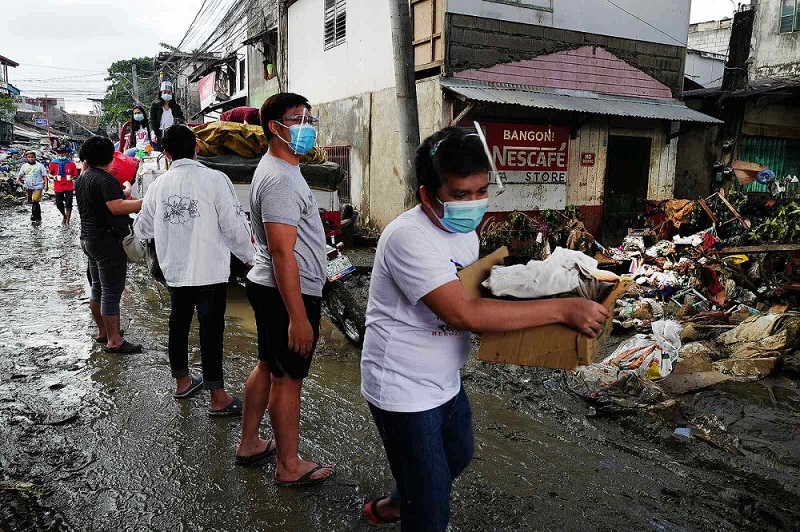
November 30, 2020 Monday

MANILA, 1 December 2020 — The Climate Change Commission (CCC) lauded the recent adoption by the House of Representatives in plenary of a Resolution by the Committee on Climate Change to declare a climate and environmental emergency in support of the continuing efforts of the government to address the worsening impacts of the climate crisis.
House Resolution No. 1377, introduced by House Committee on Climate Change chair and Bohol 1st District Representative Edgar Chatto; Deputy Speaker and Antique Representative Loren Legarda, the late Cebu City 1st District Representative Raul Del Mar; Lanao del Sur 2nd District Representative Yasser Alonto Balindong; Masbate 2nd District Representative Elisa Kho; Negros Oriental 1st District Representative Jocelyn Sy Limkaichong; Bayan Muna Representative Eufemia Cullamat; and CWS Representative Romeo Momo, Sr. urged the declaration of a climate and environmental emergency, ensuring enhanced and coherent climate actions in the executive and legislative agenda of the government.
“A global campaign to declare a "Climate Emergency" started as early as 2003, in recognition of the intensifying complications brought about by global warming and climate change, and of the corresponding needs and implications to accelerate actions, including investments and mobilization of resources. The key elements of the campaign include the building of public awareness as acknowledgement of the threats of such emergency, the declaration of a climate emergency by governments to trigger societal actions, and demand for mobilization at a sufficient scale and speed, considering the urgency of implementation of such actions,” HR No. 1377 reads.
“In declaring a climate emergency, the government admits that global warming exists and that the measures taken up to this point are not enough to limit the changes brought by it. The decision stresses the need for the government and administration to devise measures that try and stop human-caused global warming,” it added.
HR No. 1377 gave full recognition to the CCC’s National Panel of Technical Experts’ (NPTE) call to shift from using the term “climate change” to “climate emergency” to pursue immediate action against global warming. The NPTE, currently chaired by Dr. Carlos Primo David of the University of the Philippines National Institute of Geological Sciences, had recommended that “as one of the most climatically vulnerable countries in the world, the Philippines should mobilize its people, institutions and resources to enhance its ability to prepare and even prosper amidst the climate emergency.”
Further, HR No. 1377 mandates itself to:
Encourage that climate urgency be placed at the center of all policy decision-making from local to national level;
Encourage local governments to issue Climate Change Declarations within their respective jurisdictions;
Call on the Climate Change Commission to spearhead the collection and consolidation of relevant data with national government agencies as well as local government units, in collaboration with the National Panel of Technical Experts, to come up with a climate risk assessment of the country, to produce baseline studies that consider future scenarios and impacts of climate change, to perform sustainable development and resilient investment planning, programming and financing at the national, sectoral, and local levels;
Call on the major carbon emitters, locally and abroad, to take responsibility for climate change and to reinvest in renewable and sustainable energy;
Call on local governments to adopt a "No to Coal" or "No to New Coal Policy" within their respective jurisdictions;
Call on local industries and local government units to pursue renewable and sustainable energy sources;
Conduct an audit of relevant national government agencies and local government units in relation to their compliance to existing environmental, climate, disaster risk reduction and management and appropriation laws, and international agreements in light of the climate and environmental emergency with the end in view of ensuring an enhanced national monitoring and evaluation system for the implementation of these laws and warranting the accountability of government officials, private entities and other involved stakeholders; and
Enjoin national government agencies to promote convergence of efforts toward strengthening data science, technology development, and research for climate change adaptation and mitigation, including the establishment of a national integrated risk information system and a national loss and damage registry, to support science-based policy formulation and risk governance at national and sub-national levels.
Earlier this year, the call for a nationwide declaration of climate emergency was also adopted by national government agencies in the Cabinet Cluster for Climate Change Adaptation, Mitigation and Disaster Risk Reduction (CCAM-DRR), in recognition of HR No. 535 authored by Albay Province 2nd District Representative Joey Salceda.
In his previous State of the Nation Addresses, President Rodrigo Roa Duterte expressed in categorical terms that addressing climate change was a key focus of his administration and would continue to be a top priority. This was followed by his stronger expression of resolve in his address to the 2020 UN General Assembly and at the recent 37th Association of Southeast Asian Nations (ASEAN) Summit where he called on other vulnerable countries, along with the Philippines, to demand climate justice and urge developed nations to rapidly cut their carbon emissions which are the most responsible for fueling the climate crisis. He also asked the international community to keep their commitments to the goals of the Paris Agreement.
The Climate Change Commission, as the lead policy-making body of the government for coordinating, monitoring and evaluating climate change programs and policies, underscores the need for the Philippines, being one of the most climate-vulnerable nations, to heighten the capacity of its people to survive amidst the climate emergency by mobilizing its people, institutions and resources.